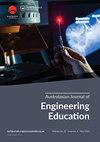Teaching engineering ethics: a dissenting voice
Q1 Social Sciences
Australasian Journal of Engineering Education
Pub Date : 2021-01-02
DOI:10.1080/22054952.2021.1925404
引用次数: 5
Abstract
ABSTRACT The reference to ‘a dissenting voice’ in the title has a double meaning. On the one hand, this paper itself provides a dissenting voice, in that it challenges a number of common practices and widely held views. (For example, challenging the typical focus on case studies, and the focus on the decision-making of individual engineers.) In addition though, the paper argues that teachers of engineering ethics should be willing to discuss the state of the profession, and be willing to criticise the profession and the professional institutions (where appropriate), providing a dissenting voice and aiming to inspire the engineers of the future to challenge the status quo and ultimately to strengthen the profession.工程伦理教学:一个反对的声音
题目中提到的“一个反对的声音”有双重含义。一方面,本文本身提供了一个不同的声音,因为它挑战了一些常见的做法和广泛持有的观点。(例如,挑战对案例研究的典型关注,以及对工程师个人决策的关注。)此外,本文认为,工程伦理教师应该愿意讨论该行业的现状,并愿意批评该行业和专业机构(在适当的情况下),提供不同的声音,旨在激励未来的工程师挑战现状,最终加强该行业。
本文章由计算机程序翻译,如有差异,请以英文原文为准。
求助全文
约1分钟内获得全文
求助全文
来源期刊

Australasian Journal of Engineering Education
Social Sciences-Education
CiteScore
6.40
自引率
0.00%
发文量
8
 求助内容:
求助内容: 应助结果提醒方式:
应助结果提醒方式:


